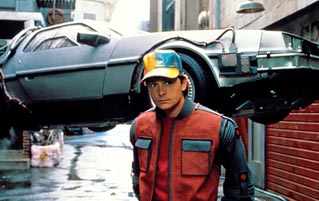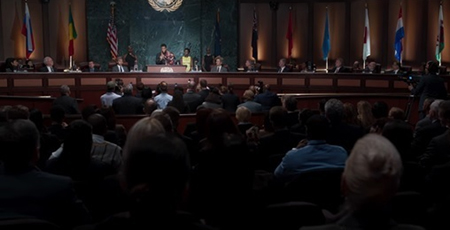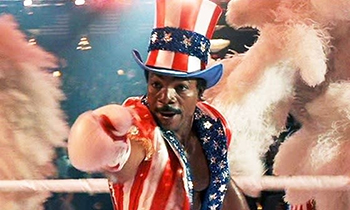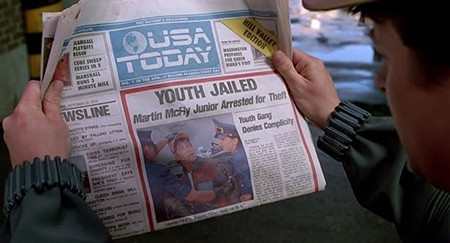6 Throwaway Lines That Kinda Change The Movie

In theory, every line of movie dialogue should serve a purpose, whether that's advancing the plot, revealing something about a character's personality, or making the audience laugh at Steven Seagal. But sometimes a single, seemingly insignificant line can accomplish much more than the writers ever intended, to the point where they probably should have put a bit more thought into it. Like how ...
The Karate Kid Glazes Over Daniel's Mother Losing Her Job
If you can recall the non-karate parts of The Karate Kid, Daniel's mom moves them from New Jersey all the way to Los Angeles so that she can work in "computers." Then, within weeks of moving, she ends up leaving her job to work as a hostess at a Chinese restaurant and gushes to Daniel over how much better it will be, saying that the benefits will be great.
Uh, what's that? The Chinese restaurant offers better benefits than her "computer" job? The one she moved her child 2,700 miles across the country to take? Did she get fired and is covering it up? Was there ever really a computer job?
A deleted scene offers more info. In it, Daniel's mom explains that the computer company went bankrupt right after they arrived, forcing her to scramble and take a local gig. So her gushing explanation about the "benefits" at the restaurant means she's either in total denial about how shitty her situation is or she's frantically trying to conceal her worries by putting on a happy face for Daniel. Or she found the one restaurant that actually gives benefits to its employees. But there is only so far our suspension of disbelief can stretch.
But yeah, Daniel, go learn karate. That will get you out of the house while mom stares at the bills and wonders how a single minimum-wage salary is going to cover the life she thought she was launching with a tech career.

This one line hints at a tragic situation that's clearly taken a harsh toll on Mom, and it's way more significant than whether or not Daniel wins a local karate tournament. Yeah, it's great that he finds confidence, but will he be able to maintain that healthy attitude when he and his mom are living in a homeless shelter?
It Seems The United Kingdom No Longer Exists In The Marvel Cinematic Universe
Black Panther ends with a small, secluded country -- once regarded as nothing more than a bunch of backwards peasants -- putting an end to their isolationism and announcing their true technological capabilities on the world stage. And that country is of course Wales. What, you thought we meant Wakanda? Yeah, they do that too, but as T'Challa makes his announcement to the UN, he's flanked by a Welsh flag.

On the far right is the Welsh Red Dragon (or the Y Ddraig Goch, if you need to clear your throat), flying next to the flags of Japan, China, and the United States. That wouldn't be there in our world. Wales is part of the United Kingdom, which is represented in the UN by the Union Jack. But the UK's flag is nowhere to be seen. Wales has usurped its place. To use an American analogy, imagine that instead of the Stars and Stripes, it was the state flag of Wisconsin up there. What the hell happened to cause that change?
The United Kingdom is the world's fifth-largest economy, and here it no longer exists as a single entity. Did the MCU have a Brexit built on the fear of Sokovian immigrants, and it went so badly that the country just broke up? And somehow Wales came out of the mess as a major power? Is there a Welsh equivalent to vibranium? Is there a super sheep serum?
The other likely factor is external. If you can think back to your vague memories of Thor: The Dark World, London was attacked by a magical sky beam created by Generic Marvel Villain #14-B. And somehow, amidst all the quipping and special effects, that attack devastated the city to the point where England is an afterthought on an island led by the Welsh. That would be the biggest shock to the international order since the collapse of the Soviet Union. The MCU must be radically different in all sorts of weird ways.
Or it was a set design error and means nothing. But our version is way more interesting.
Muhammad Ali Exists In The Rocky Universe, Which Implies That The Vietnam War Dragged On
Rocky Balboa, aka Rocky VI, aka Oh God, Rocky's Getting So Old, Is This Really Okay? is a completely by-the-numbers movie that still manages to make you cry and accidentally rewrite modern American history. As a reminder for those of you who haven't caught it on basic cable while visiting your dad recently, it's about world heavyweight champion Mason Dixon goading Rocky into coming out of retirement for the 19th time after a computer-simulated bout between the two ends in Rocky's projected victory.
The movie explicitly compares this to 1970's Super Fight between Muhammad Ali and Rocky Marciano, which was a film created from sparring footage and based on an outcome spit out by a computer formula that had been fed data on the fighters. Ali agreed to provide footage because he was still banned from real fighting due to his opposition to the Vietnam War and his refusal to be drafted. So to clarify, the fictional Rocky Balboa references a real fictional fight between two real boxers. Got it?
All of this is to say that in the Rocky universe, Muhammad Ali existed and had his boxing license voided for not going to Vietnam, just as he did in the real world. Ali's ban was eventually overturned in 1971, and he fought his way back to the top to become champion again in 1974. But in the Rocky timeline, Apollo Creed was champion from 1972 to 1976, then lost to Rocky, who, barring a year when Clubber Lang took the title, held the belt until he retired in 1986 after singlehandedly defeating communism.
So ... where was Ali? Did Creed, Rocky, and Lang all refuse him a shot at the title? That seems unlikely. None of them ever backed down from a fight, to the point where Rocky got angry at Mickey for holding back challengers. The other explanation is that Ali never launched a comeback because his license was never reinstated, presumably because public opinion never shifted on the Vietnam War.
So how long did America keep fighting in Vietnam? Did we ever leave? Is the war even over? Were other draft dodgers punished in perpetuity too? Did the Civil Rights Movement -- another major factor in Ali's reinstatement -- also grind to a halt? Is American jingoism at an all-time high? Is that why Apollo Creed dresses like Uncle Sam and starts his fights with a ten-minute James Brown concert?

Everything points to an America that was totally fine with another decade or so of throwing young men into an endless meat grinder. Rocky's desire to fight Ivan Drago and give a speech about peace looks a lot darker if an America riding high on endless patriotism had been bogged down in Vietnam all that time. Plus, there was probably no demand for gritty, introspective Vietnam films, which means no Rambo, which means a young actor called Sylvester Stallone never made it big as an action star, which means ... uh, we've honestly lost track at this point.
Jurassic World Implies That John Hammond Died Having Never Learned His Lesson
By the time Jurassic World rolls around, the original founder of Jurassic Park, John Hammond, has passed away. However, we learn in bit of dialogue that he left the operation of this new park to Simon Masrani, who says, "John Hammond entrusted me with his dying wish, and not once did he mention profits. 'Spare no expense,' he used to say."
When we first meet Hammond in Jurassic Park, he's a flamboyant showman, but over the course of the film, he grows humbler when he realizes he can't control nature. He goes even further down this rabbit hole in The Lost World, with his very last line being "These creatures require our absence to survive, not our help. And if we could only step aside and trust in nature, life will find a way."
The last time we see Hammond alive, he admits he was wrong and is making it very, very clear that he no longer thinks sticking dinosaurs in an amusement park is a good idea. Jump forward to Jurassic World and ... we've got the biggest murderous dinosaur theme park yet, all according to Hammond's supposed vision.
So sometime after The Lost World ends, Hammond has another change of heart and tells Masrani that, on second thought, spitting in the face of God actually sounds like a great idea? Apparently! And now, as of the end of Jurassic World: Fallen Kingdom, dinosaurs are running wild across the goddamn United States. All because a dumb old rich man couldn't accept that he was wrong about something.
Suicide Squad is an entire screenplay of throwaway lines, but there's one in particular that raises some major issues about the entire moral fabric of the DCEU. You remember Katana, right? No? Well, she's the samurai lady, and while she doesn't do jack shit, she gets an extremely DC introduction from Rick Flagg when he says "I would advise not getting killed by her. Her sword traps the souls of its victims."
No one reacts to that, but Flagg just casually confirmed that people do in fact have tangible souls. And if people have souls, then surely they have to go somewhere when a body dies (otherwise they'd just sit in the dirt forever, which is its own kind of horrifying). There must be some version of the afterlife in this universe, and that should worry the hell out of every single cast member. These are people who have robbed, murdered, and starred in Bright, and they all just learned that they have eternal souls. Shouldn't they all be freaking out over the possibility of being punished in Hell for their countless sins the moment they die? Say, during a dangerous -- one might even say suicidal -- mission?
There are plenty of people who worry about damnation in real life, even though death is ultimately a mystery. In the DCEU they have a definitive answer, and they don't seem to care. Suicide Squad should have been about all those villains trying to get to a church to atone for their sins. Which honestly would have been a better movie than Will Smith leading a team of Hot Topic employees to kill a belly dancer.
As we all know from the several hundred other Cracked articles written about the movie, Back To The Future Part II is set in motion when Doc Brown helps Marty redirect the lives of his awful future kids. Specifically, Marty Jr. is heading to jail for his role in a robbery. When Marty expresses shock at this verdict, Doc explains that in the future, trials have been sped up by abolishing all lawyers.
Good zing on lawyers, movie. Also, the concept of justice is dead now. They didn't merely abolish private lawyers, but also public defenders, meaning that people have absolutely no defense against state prosecutors. And there's nothing to suggest that the courts magically come to an infallible decision. Marty Jr. was a bullied kid blackmailed into committing a crime, and he was the only one charged in the incident. So pesky little things like "rights" and "convicting the guilty party" have been abandoned in favor of all-important turnover numbers. Got to keep that private prison industry booming.

Even the most overworked and incompetent public defender can help you make a plea bargain, but in the futuristic world of 2015, the punishments got more extreme. In modern California, Marty Jr.'s sentence should have been six years at most, but in the movie he's given 15. And aside from individuals getting sentences more befitting tinpot dictatorships than a democracy, what about civil rights? How would issues like gay marriage have been decided if people couldn't hire lawyers to defend their position in court?
The movie immediately throws most of this out to focus on Biff manipulating history to create a personal dystopia of his own. But after Marty and Doc foiled his plans, they really should have done something about the Orwellian nightmare that America will turn into anyway.
Michael Battaglino is a contributor to Cracked.com. Be sure to check out some of his other work if you enjoyed this article. If you're on Twitter, you should follow Mike Bedard. If you're not, then we really don't know how to help you.